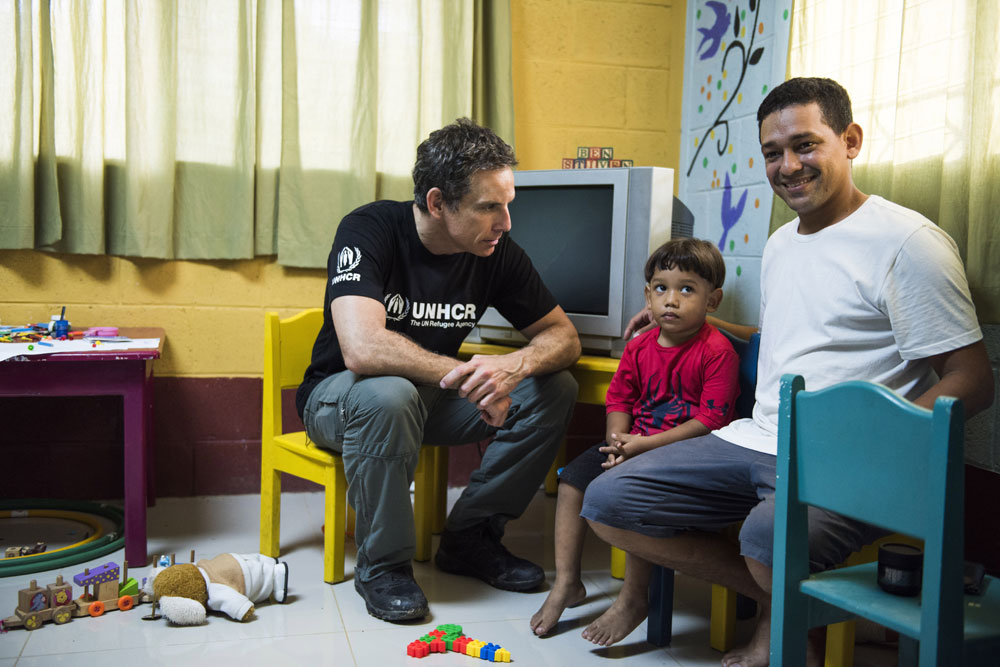
One of the most despicable aspects of the immigrant detention and family separation policy is that South and Central Americans coming to the US are often fleeing horrific conditions in their home countries. While seeking asylum from unlivable situations they’re having their children taken away to be packed in cages on the ground with no toys, blankets, books or family. I’m not even exaggerating. It’s hard to imagine the human cost of this policy in the abstract, but stories like those of Mirian, a Honduran woman whose 18 month-old son was taken from her without even a chance say goodbye to him, show how devastating it is. (Miriam’s plight was captured in a video recorded for the ACLU by celebrities reading a letter she’d written. She’s since been reunited with her son. Stories of the atrocities in the processing centers, detention camps and immigration kangaroo courts have come out from advocates like Congressman Cory Booker and Senator Elizabeth Warren.)
When celebrities visit other countries to understand the refugee crisis it does make a difference. We’ve seen Angelina Jolie become a tireless advocate while working with the UNHCR for years. Ben Stiller recently took a UNHCR trip to Guatemala to see the impact of the violence and destabilization in that region. He wrote an essay for The Hollywood Reporter in which he admits was shocked by what he learned. He was also touched by the people he met and by the joy the orphans showed at his visit. I came away from this grateful for the celebrities who advocate for immigrants and refugees. It takes humility and vulnerability to do work like this. Here’s some of Stiller’s essay, with more at the source.
I made my safe and easy trip to Guatemala, where I had the experience of actually getting to know some of the men, women and children who have fled their homes, who were on the move, literally running for their lives. Spending time with them, it was impossible not to feel connected as fellow humans. We laughed, ate and talked about raising children and the love of our families. As they relayed their stories, I was repeatedly reminded that refugees live in a world that shows them little goodwill. That what they need more than anything is to be given a voice. To be supported and heard — especially the refugees from this region of the world.
While refugees in many parts of the world are fleeing the devastation of war, the situation in northern Central America is different. In this specific region, across countries like Honduras, El Salvador and Guatemala, people are fleeing unchecked violence and persecution at the hands of gangs. Shockingly, over half are children who have been subject to abuse, sexual trafficking and forced recruitment by gangs. Many have been separated from their families as a result of deportations in the United States and Mexico.
I met a Salvadoran father who is a talented artist. His work adorned the inadequately small room he shared with his father, two sons, 3-year-old daughter and wife — a professional chef. This man, this refugee, whose face I cannot show you and whose name I cannot tell, watched as his best friend was shot down in the street, simply for trying to protect his son from gang recruitment. Realizing his own son would be next, this father had no choice but to flee with his family.
Almost everyone I talked to had a similar or more harrowing story to tell.
The fact is that refugees in Central America are part of an invisible crisis, one that is hard to explain for a few reasons — the first being that few refugees from this region feel able to tell their story without immense fear. Equally disturbing is the fact that violence is so “normalized” in their lives that they no longer even refer to it as unusual, so it goes unreported. There is not a war or conflict to report on like elsewhere in the world. No named “terror” group or labeled crisis, no pictures of bombs or violence that we normally associate with people running for their lives. No masses of people at borders to take images of and draw the media cameras, no sprawling refugee camps. And for all these reasons, this situation remains invisible, misunderstood, ignored, underfunded and worsening daily.
The treatment of refugees coming to the US for asylum is inhumane, and this brings it home just how awful and punitive it is. They deserve our compassion, help, and all the comfort we can give them. Last weekend I went to a fundraiser for an organization that does work with refugees in that community. They provide translators, rides, food, clothing and housing assistance. I was so impressed by how they’re addressing the needs of immigrants in their community, and they’re doing it independently. I used to live in Germany, and their government has made it a priority to welcome refugees and help them integrate into society. Imagine how much different things would be here if our government did the same.
Stiller is helping to tell the real stories of immigrants and refugees. They are people just like us, including children, in conditions that are difficult to even imagine. They’re being portrayed as criminals and gangsters by those in power in the US now, and we cannot let that continue. We have to continue fighting for them, and to continue telling their stories.
The quote in the title is from the first video below. You can contribute to the UNHCR online. Here is a link to more charities doing work in this area.
photos credit: UNHCR and Ben Stiller/Instagram and via WENN



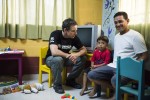
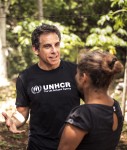
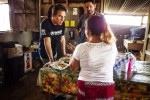

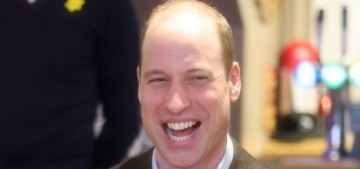
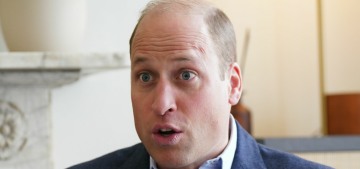

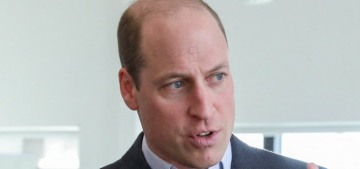





Thanks to all the celebrities that bring attention to bad situations. I”m glad they’re bringing their star power for good
I agree. I know there a woman who does this tirelessly (coughJoliecough) who constantly gets called out for doing this (“PR!”) but I think it’s a good thing when anyone with a public platform (like celebs) helps out this way.
I hope Ben lasts longer than most celebrities. Except for Angelina and a couple more, most celebs only want good PR for a film or to rehabilitate their image.
On the drive to work I was just thinking of all my fellow Indigenous Peoples from the south fleeing. I guess it’s because I have my two nieces visiting for the summer and they’re so full of life and love because they’re not holding the ghosts of childhood separation.
What is also not reported enough is that there was a trade route from South America to North America by Indigenous Peoples. If you google “north america south america Indigenous trade routes” you’ll find a bevy of information.
For the purposes of land claims, this was greatly researched and I went out onto our territories once and saw the footsteps of our ancestors in the trees and ground. The people fleeing South America were coming to and from North America long before Columbus.
I saw a sign at a protest that said, “Our Indigenous brothers and sisters from the south have been coming here since before Columbus and are not illegal” or something along those lines and it’s true.
I know Ben Stiller hasn’t always been a good person but it was great of him to do this and to raise awareness. He may have a lot of fans among a certain sect of the population and him going – as opposed to say Angelina – may offer different people a different set of eyes on this.
The problem with Ben Stiller is he’s not very well known. People are not likely to click on an article when his name is mentioned, opposed to Angelina Jolie or even Charlize Theron.
We all know when someone wants their PR read, they mention Angelina Jolie”s name.
At the risk of beating a dead horse – these people are native americans and ought to be able to move around this continent without regards to colonial imposed borders. Separating these families is the continuation of a centuries long genocide. There is a movement among Mexican Americans and other latinos called #identifynative2020. It calls for mixed race hispanics to reject the terms mestizo, hispanic, latino/a/x and identify as native on the 2020 census.
Well said.
It’s not just a matter of humanity, it’s a matter of responsability. Many of the conflicts happening in Central America countries were fuelled by American politics during Cold War.
I’ve heard a lot of bad things about Ben Stiller but no shade here. Hopefully it will open the eyes to some more people in his fanbase, which tends to skew older and whiter.
The messenger is bad, but the message needs to be heard.
I wish more people knrw about The School of Americas and how that directly created the issues we are seeing today. If you have a few free moments please read up, it really puts things into perspective as to why we should help these people.
My dad fought in the Guatemalan civil war (against the brutal dictatorship) until immigrating to the US in the 80’s. He had hoped after the war that the region would stabilize and flourish, but it didn’t. Recently my scousin and her kids had to flee to the US because her husband was murdered by a gang right in front of his family. Simply because he tried to play a soccer game in their “territory”.
What I’m trying to say is the entire region has endured violence and devastation for decades, much of it due to US backing of brutal regimes, and it goes underreported in the international press. I’m so grateful to Stiller for bringing attention to these problems, hopefully the world will take notice and take action to help.
I haven’t heard of this movement before, but it makes sense to me. I always thought of myself as Latina until my Ancestry dna results came back as 28% Native American, Central American concentration. Maybe I’ll take up the new label when the next census comes around.
Very cool